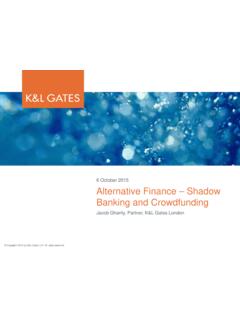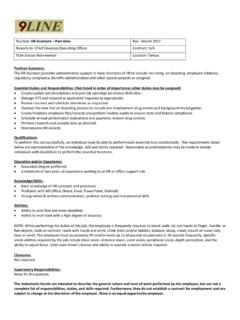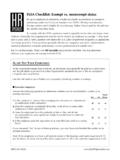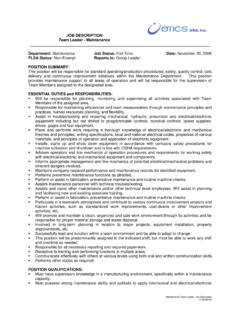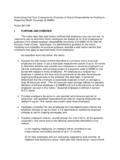Transcription of Salary Deductions Under the FLSA: How Employers Can Stay ...
1 K&LNGA lertKirkpatrick & Lockhart Nicholson Graham LLPAPRIL 2006 Employment LawSalary Deductions Under the flsa : How Employers Can Stay Out of TroubleEmployers should take time to learn about two recentopinion letters from the Department of Laborthat address Deductions from the pay of salaried,exempt employees Under the Fair Labor StandardsAct (" flsa "). The Department had implementednew regulations governing these "white collar"exemptions in August of 2004. The regulationsupdated and simplified existing overtime exemptionsfor executive, administrative, and professionalemployees whose salaries and duties met certaincriteria. They also added an important new safeharbor provision relating to improper salarydeductions.
2 Since the regulations were promulgated,the new Salary levels and duties tests have receivedmuch attention; however, there has been less focuson what qualifies as a Salary and what consequencesdeductions can have on that Salary . These two opinion letters highlight issues that mayarise with respect to Deductions from salariedemployees' pay. Employers should not overlook thesignificant consequences of improper salarydeductions. Improper Deductions could result in allsalaried, exempt employees in a given jobclassification losing their exempt status andbecoming entitled to additional overtime pay. This Alert describes what Deductions are permitted,summarizes the two recent opinion letters, andexplains how written policies can help shieldemployers from costly consequences.
3 Salary Deductions AND CONSEQUENCES OFIMPROPER DEDUCTIONSTo satisfy the Salary component of the white collarexemptions, an executive, administrative, orprofessional employee must be paid on a Salary basisat a rate of not less than $455 per anemployee on a " Salary basis" means the employermust pay the employee a predetermined amount notsubject to Deductions based on the quality or quantityof the employee's work. In other words, an employermust pay an exempt employee his or her full salaryin any week in which the employee performs anywork, regardless of the number of days or hoursactually worked. However, an employer mayreducean exempt employee's Salary in the following limitedcircumstances: nIn an employee's initial or final week of employment, an employer may reduce the Salary amount to reflect the time actually worked.
4 NWhen an employee is absent from work for one or more full days because of personal reasons other than sickness or disability, an employer mayreduce the employee's Salary in full-day increments based on the number of full days the employee was absent. An employer may not reduce the employee's Salary for partial days of work. nWhen an employee is absent from work for one ormore full days because of sickness or disability, an employer may reduce the employee's Salary in full-day increments in accordance with a bona fide plan, policy, or practice that covers sickness or disability pay. An employer may similarly reduce an employee's Salary when the employee receives Salary replacement benefits Under state disability or workers' compensation employer with a sick or disability plan, policy,or practice may also reduce an employee's Salary 1 Although this Alert addresses only salaryrequirements for the exemption, it is worth noting that administrative and professional employees satisfying the duties tests may also qualify for the exemption if they are paid on a feebasis, in accordance with 29 Computer employees satisfying the duties test may qualify for the exemption if they are paid an hourly rate of not less than $ per hour.
5 See29 (b). Additionally, there is no Salary or fee requirement for outside sales representatives, teachers, doctors, or lawyers. See29 (c); (d); (d).KKiirrkkppaattrriicckk && LLoocckkhhaarrtt NNiicchhoollssoonn GGrraahhaammLLLLPP|| APRIL 20062for such full-day absences if the employee has not yet become eligible for, or has exhausted all leave Under , the employer's plan, policy, or an employee takes unpaid leave Under the Family and Medical Leave Act, an employer may reduce the employee's Salary based on the amount of time the employee is an employee is absent because of jury duty, attendance as a witness, or temporary military leave, an employer may use the jury fees, witness fees, or military pay received by the employee to offset the Salary owed.
6 However, the employer is prohibited from further reducing the employee's Salary for these an employee violates a safety rule of major significance, an employer may impose a Salary deduction as a penalty against the employee. Such a deduction can be equal to a partial day's an employer suspends an employee withoutpay pursuant to a written disciplinary policy for workplace conduct, the employer may reduce the employee's Salary based on the number of full days for which the employee was suspended. A reduction in Salary that is inconsistent with theserules is considered an improper deduction . Thepractice of making improper Deductions shows thatan employer did not intend to pay employees on a" Salary basis" and, therefore, disqualifies employeesfrom the overtime exemption.
7 An isolated orinadvertent improper deduction will not destroy theexemption if the employer reimburses the employeefor the deduction . However, if the Department findsan actual practice of making improper Deductions , allemployees in the particular job classification subjectto the Deductions could lose their exempt status forthe period during which Deductions were made, evenif some of those employees never had their ownsalaries reduced. Loss of the exemption would thensubject the employer to liability for overtimecompensation in addition to the salaries already employer could also face civil penalties forrepeat or willful overtime OPINION LETTERS ADDRESSING SALARYDEDUCTIONSFLSA Opinion No. 2006-7 addressed deductionsfrom exempt employees' salaries for loss or damageto company equipment.
8 Specifically, an employersought to impose a fine, equal to repair orreplacement costs, on exempt employees who lost ordamaged company-owned mobile phones and laptopcomputers. The opinion letter explained that thistype of deduction violates the prohibition onreducing compensation based on the quality of anexempt employee's work. Moreover, thesedeductions do not fall within one of the categories ofdeductions expressly permitted by the opinion emphasized the Department of Labor'sposition that any deduction not expressly permittedby the regulations violates the " Salary basis"requirement for exemption, even if the employer hasa signed authorization or agreement from theemployee. By way of example, the opinion lettermentioned the following Deductions that have beendeemed to be improper: Deductions for cash registershortages, Deductions reflecting unacceptably highcharges for unauthorized phone calls, and deductionsfor costs incurred when an employee erroneouslyexecuted an order to buy/sell 1,000 shares, instead of100 shares, of stock for a client.
9 The opinion letteralso explained that it does not matter whether theemployer takes the deduction directly from theemployee's paycheck or requires the employee tomake an out-of-pocket reimbursement. Eithermethod prevents the employee from receiving asalary that is "free and clear" and paid on a"guaranteed" Opinion No. 2006-6 explained that employersmay require salaried, exempt employees to work aspecified number of hours per week and may requirethem to make up time lost for personal absences ofless than one day. Employers may discipline exemptemployees for failure to comply with policies orrules concerning work hours, so long as thedisciplinary action does not run afoul of theregulations. For example, an employer should notdock an exempt employee's Salary for not workingrequired hours or for failing to make up lost opinion letter made a point of noting that failureto work a requisite number of hours or to make uplost work time does not constitute violation of a"workplace conduct rule" for which an employercould suspend an employee for one or more days.
10 "Workplace conduct" does not include workplaceperformance or attendance issues. While these opinion letters did not announce a newposition from the Department of Labor, theyunderscored the Department's strict adherence tosalary requirements for exempt employees and itsnarrow view of permissible && LLoocckkhhaarrtt NNiicchhoollssoonn GGrraahhaammLLLLPP|| APRIL 20063 THE IMPORTANCE OF A CLEARLYCOMMUNICATED POLICY AND COMPLAINTPROCESSThe best way to prevent the potentially costlyconsequences of improper Salary Deductions is tohave a written policy that articulates the prohibiteddeductions and provides a complaint process fornotifying the employer of improper Deductions . Such a policy can benefit an employer in twoimportant ways.


